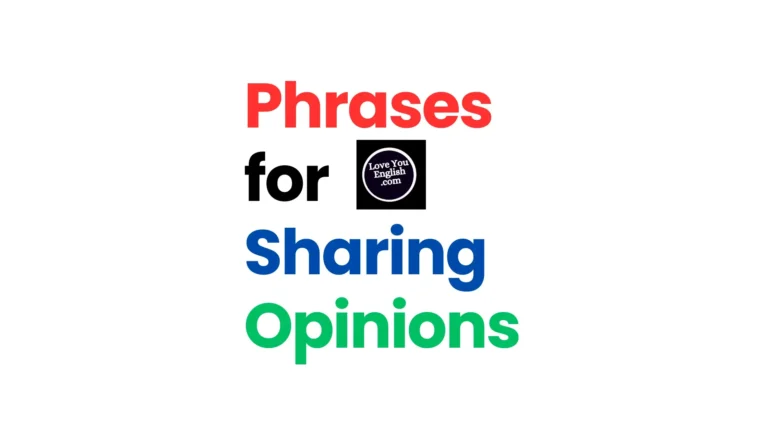English Phrases for Family and Relatives
Hello everyone,
When talking about our families and relatives, there are many different words and phrases we can use in English.
Some of these refer to the different relationships within a family.
Other phrases describe how people are related to each other.
And there are also some common idioms and expressions that involve family members.
In this lesson, we will look at vocabulary for immediate family members, extended family, in-laws, ways to describe relationships, and some useful family idioms and expressions.
Let’s get started!
Immediate Family Members
The immediate family refers to the closest relatives – your parents, siblings, spouse, and children.
Here are some key words for these close family ties:
Mother/mom, father/dad, parent(s)
Son, daughter, child/children
Brother, sister, sibling(s)
Husband, wife, spouse
Baby, infant
Family names: maiden name (woman’s surname before marriage), married name, last name/surname/family name
For example:
“I have two younger sisters and one older brother.”
“My wife’s maiden name was Jones.”
“Our baby boy was born last month!”
Extended Family
The extended family includes relatives outside the immediate family circle, such as grandparents, aunts, uncles, cousins, etc.
Let’s review some vocabulary:
Grandparent(s): grandmother/grandma, grandfather/grandpa
Aunt, uncle
Cousin (first cousin, second cousin, etc.)
Niece, nephew
In-law(s) (covered in more detail below)
Step- (stepparent, stepchild, stepbrother, etc.)
Great-aunt/uncle, great-grandparent, etc.
For example:
“We’re visiting my grandmother this weekend.”
“My cousin Sarah and I are very close.”
“After the divorce, my stepmom moved out.”
In-Laws
Your in-laws are the relatives you gain by marriage.
Key in-law terms include:
Mother/father-in-law
Son/daughter-in-law
Brother/sister-in-law
Stepmother/stepfather-in-law
For example:
“I get along really well with my mother-in-law.”
“Tim is married to my wife’s sister, so he’s my brother-in-law.”
Describing Relationships
Often, we need to specify or describe how two people are related.
Some common ways include:
Paternal (father’s side), maternal (mother’s side)
“My paternal grandmother still lives in Italy.”
relation, related by blood/birth/marriage
“We aren’t related by blood, just marriage.”
adopted, biological, step-
“Even though I was adopted, I’m still close with my biological parents.”
ancestor, descendant, forefather
“Queen Elizabeth II had many famous ancestors.”
twin, triplet, etc.
“The triplets were born two months premature.”
ancestor, descendant, forefather
“Genealogists study ancestry and track descendants”
distant/close/immediate relative
“We’re very distant relatives – maybe fifth or sixth cousins.”
For example:
“After she re-married, we gained a stepfather and step-siblings.”
“Tracey and Angela are identical twins – I can never tell them apart!”
Family Idioms & Expressions
Like many topics, there are many colorful English idioms and expressions related to family relationships:
The black sheep of the family (the non-conformist)
“Ever since he dropped out of college, Martin has been the black sheep.”
A chip off the old block (resembling a parent)
“Lisa is certainly a chip off the old block – just as stubborn as her dad!”
Ran in the family (hereditary/shared trait)
“Mathematical ability really runs in their family.”
Like two peas in a pod (very similar)
“Those young twins are like two peas in a pod!”
The apple doesn’t fall far from the tree (child resembles parent)
“With her talent for art, the apple didn’t fall far from the tree.”
Family comes first (prioritize family)
“Even with the big promotion, for Dave family still comes first.”
For example:
“I may be the black sheep, but at least I’m following my own path.”
“The artistic genes must run in your family – your kids are so creative!”
Final thoughts:
As you can see, English has a very extensive vocabulary for discussing family members and relationships.
While some of the terms are fairly straightforward, learning the idioms and different ways to describe family ties can help you sound more natural when speaking English.
Of course, this is just an overview of the most common phrases.
Depending on your own family situation, there may be many other terms you need to know.
But hopefully this gives you a solid starter guide to discussing your family and relatives in English!
____________________
Check out these awesome phrases & Idioms books I recommend:
IDIOMS and PHRASES Anglo,Synonyms and Antonyms Anglo,One Word Substitution






